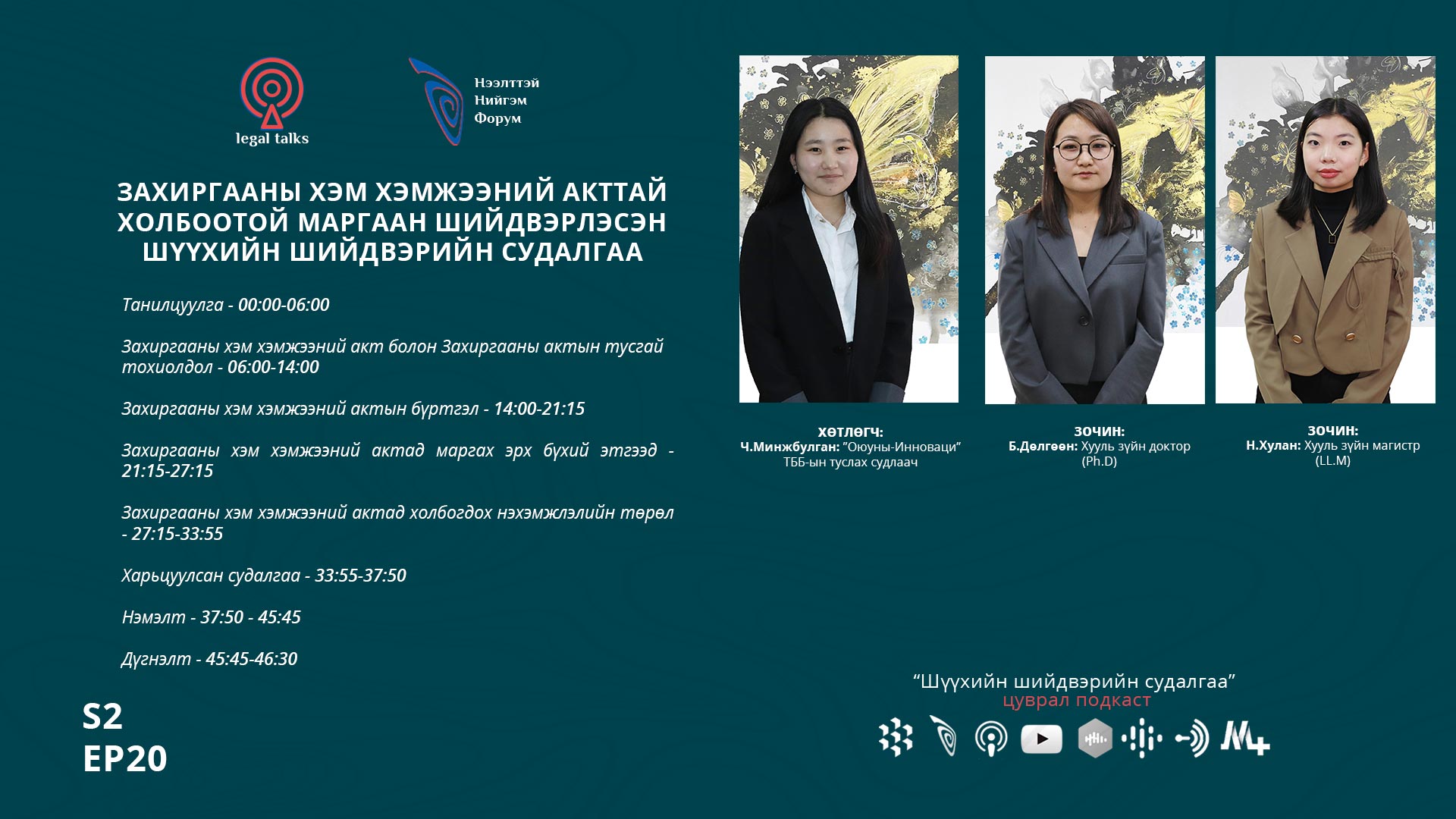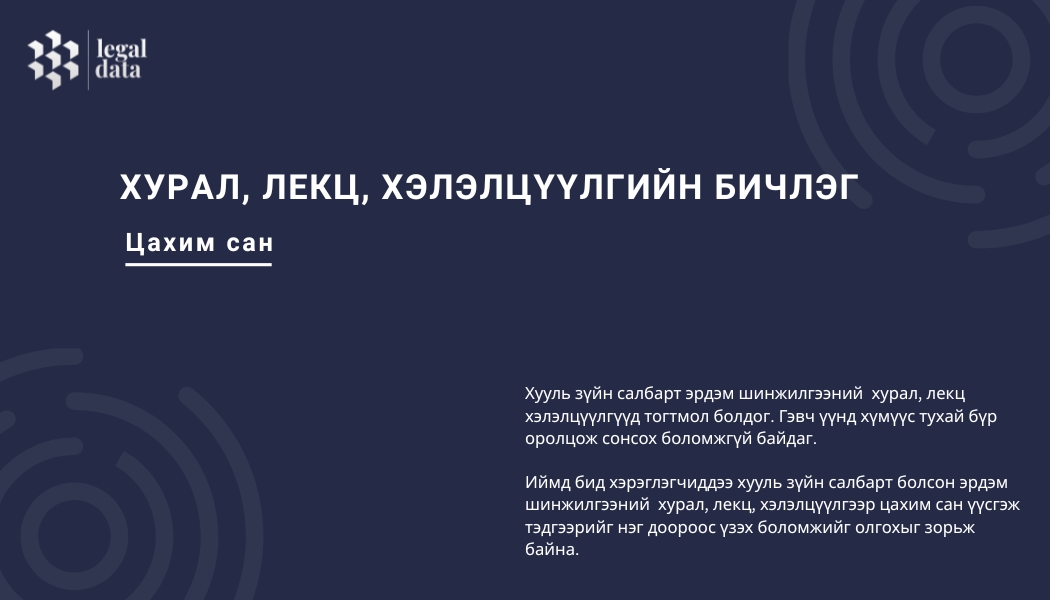Бүтээлийн нэр
Democratization and judicial independence: a case study of Mongolia
Зохиогч
Хэлбэр
Магистрын ажил
Салбар
Үндсэн хуулийн эрх зүй
Бүтээлийн товч
In 2011, the President initiated a package of laws regarding the judicial system of Mongolia, and the Parliament approved it in 2012. After that approval, there is a dispute emerged between scholars over the President’s constitutional ‘excessive’ rights and his negative relationship with the judiciary system of Mongolia. According to the President, nowadays Mongolian financial negative circumstances, an increasing nature of corruption incidents and the Mongolian government’s negative governance crisis can be fixed by the independent, impartial judiciary system of Mongolia, and he claimed that the package of laws can the judiciary system more independent. The questions arise from here are: is the judiciary system independent now? Can the judiciary system of Mongolia fixes all these problems alone? If an independent judiciary system is the main spirit of the liberal democracy which is the main political ideology of the Mongolian democracy, then what is wrong with the Mongolian democracy in its nature?
In order to answer these questions, this dissertation first will study the notion of liberal democracy in Mongolia. The Federal Republic of Germany’s system will be compared with Mongolian system as benchmarking, because, Mongolian political and legal system is initially derived from Germany’s example. While explaining the Mongolian legal and political system, the Mongolian President’s status will be discussed simultaneously. Next, the notion of judicial accountability and the notion of judicial independence will be discussed. While explaining some characteristics of the judicial independence, Mongolian judicial independence will be studied. Due to clarify the President’s unduly influence over the judiciary system, an appointment system of other law enforcement agencies, who can participate in the trial, will be also discussed. At the end, based on real life examples of some agencies violent actions and judges’ partial decisions will be indicated.
This study found that, formally, Mongolia has liberal democratic system. However, due to a ‘design defect’ in the judiciary system of Mongolia, contextually, there is no liberal democratic system in Mongolia. Therefore, there is no organization that can protect human rights and liberty and can keep a balance between branches. In this circumstance, by using his sovereignty of initiating laws and resolutions, with his sovereignty of appointing judges and some inquiry and investigation agencies’ heads, the President is now controlling the judiciary system of Mongolia. Consequently, some agencies are acting violently against human rights and liberty, and judges are making partial decisions.
Түлхүүр үг
Constitutional court; liberal democracy; judicial accountability; judicial independence; separation of powers; The other trial participants of the State, their Heads’ appointment
Бичигдсэн огноо
2017-03-25
Хуудсын тоо
48
Хэл
Англи
Бүтээл
Байршуулсан огноо
2019-03-05
Товч мэдээлэл үзсэн
4008
Бүрэн эхээр нь үзсэн
101
Санал болгож буй эшлэлийн загвар
Б.Туяа
“Democratization and judicial independence: a case study of Mongolia” (2017), ... дахь/дэх тал.
Legaldata-аас унших боломжтой: https://legaldata.mn/b/467
Цуглуулганд нэмэх
Бүтээлийг цуглуулгандaa нэмэхийн тулд нэвтэрсэн байх шаардлагатай.
Бүртгэлтэй бол нэвтрэх | Бүртгэлгүй бол бүртгүүлэх
Бүртгэлтэй бол нэвтрэх | Бүртгэлгүй бол бүртгүүлэх
МЭДЭЭ, МЭДЭЭЛЭЛ

“Шударга ёсны төлөө гүйцгээе – Run for Justice” олон нийтийн гүйлтэд оролцохыг урьж байна
18 hours ago

2025 оны 5 дугаар сарын эрэлттэй бүтээлийн чансаа
5 days ago

S2EP20. Б.Дөлгөөн & Н.Хулан: Захиргааны хэм хэмжээний акттай холбоотой маргаан шийдвэрлэсэн шүүхийн шийдвэрийн судалгаа
2 weeks ago

Д.Ганзориг - "Хуульчдын холбоо ба Захиргааны эрх зүй" сэдэвт хүндэтгэлийн лекц
2 weeks ago
ШҮҮХИЙН ШИЙДВЭРИЙН ХУРААНГУЙ
-
Төрийн өмчит компанийн салбар, төлөөлөгчийн газрын удирдах албан тушаалтан сонгуульд оролцохдоо албан үүргээсээ чөлөөлөгдөх ёстой.
2025-06-06
-
Байгаль орчинд учруулсан хохиролд 10,803,232,289 төгрөгийн төлбөр гаргуулахаар шийдвэрлэв
2025-05-29
-
Хохирогч сэтгэцэд учирсан хор уршгийг нэхэмжлэх эсэх нь өөрийнх нь сонголт болно
2025-05-28
-
Мөнхбатын Хүслэн
2025-06-02 Эрдэм шинжилгээний өгүүлэлдуудаж байна ! -
Мөнхбатын Хүслэн
2025-06-02 Эрдэм шинжилгээний өгүүлэлдуудаж байна ! -
Мөнхбатын Хүслэн
2025-05-30 Эрдэм шинжилгээний өгүүлэлдуудаж байна ! -
Тогтохын Эмүжин
2025-05-30 Бакалаврын ажилдуудаж байна ! -
Отгонтуяагийн Тэнхлүүн
2025-05-30 Магистрын ажилдуудаж байна ! -
Баттулгын Дөлгөөн
2025-05-28 Эрдэм шинжилгээний өгүүлэлдуудаж байна ! -
Түвшинжаргал Анужин, Эрдэнэ-Очир Жавзмаа
2025-05-27 Эрдэм шинжилгээний өгүүлэлдуудаж байна ! -
Төмөрбаатарийн Лхагважаргал
2025-05-27 Эрх зүйн шүүмждуудаж байна ! -
Равданбямбын Оюундэлгэр
2025-05-26 Эрдэм шинжилгээний өгүүлэлдуудаж байна ! -
Мөнхсүх Маралгуа
2025-05-26 Бакалаврын ажилдуудаж байна !